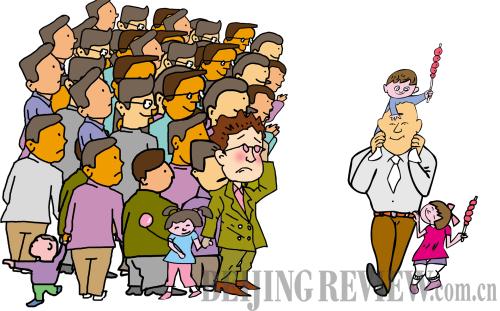|
 |
|
(LI SHIGONG) |
In 1982 China endorsed the one-child policy as one of the country's national policies.
The policy came at a special historical moment when rapid population growth in preceding decades posed increasing challenges to the standards of people's living, education, health care and employment, making it extremely difficult for the country to rid itself of poverty in the foreseeable future.
Among developing countries with huge populations, China was the only one to retain a low birth rate during part of the 20th century. But, in recent years, debate has been growing over whether the one-child policy should be abolished, since various social problems have emerged as a result such as an increasing aging population and education of the single child.
Also, the cost of implementing the one-child policy in China has been rising. Many people think it would be more helpful to Chinese society if this money and resources were used for improving people's education as well as the natural and social environment.
Abolish now
Li Jun (www.bwchinese.com): Nowadays, China's annual new births are 15 million. There were 25 million in 1988. The annual death toll is more than 100 million. In fact, it is estimated China's population is likely to stop growing around 2015, and it is doomed to decline in the near future.
The birth control policy quickens China's population decline and has resulted in many problems. A lot of reasons have contributed to the shortage of migrant workers in big cities, and one is the decline of population growth. The dilemma China now faces is an ever-increasing aging population and a shortage of young labor. Soon, the negative impact of population decline will be felt in many areas. Increasing aging population will add pressure to pensions and to younger working people. Birth control has also led to gender imbalance too, which is a very serious social problem.
The decline in new births will reduce the number of schools. At present, many primary and junior middle schools have been merged or closed because they are unable to enroll enough students. In some regions, the number of students in senior middle schools is also diminishing. In the next decade, a large number of schools in China will be merged or closed and many teachers will be fired.
After 2020, the population in China will decrease sharply. By then the Chinese Government will not only have to cancel the policy but might also have to formulate policies to encourage child birth.
The establishment of the market economy system in 1992 increased population movements, and the birth rate began to fall from that time on, compounded by the strict one-child policy. So the problem is, even if the policy is abolished now, the tendency toward a population decrease is irreversible.
Zhao Xiao (www.ce.cn): Three decades after the stringent implementation of the one-child policy, various problems have begun to emerge. There are six outstanding problems:
First is the lack of migrant workers. In 2011, Shanghai is lacking nearly 300,000 migrant workers while in Guangzhou, the shortage is more than 150,000 and in Shenzhen the gap is 800,000. From 2004 to 2011, the growth of the working age population declined at the annual rate of 13.6 percent. This is the fundamental reason leading to the migrant worker shortage since 2005.
| 